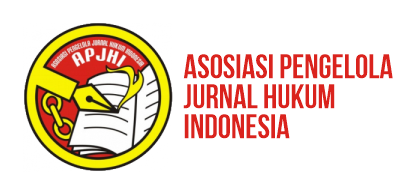Challenging Corruption: Impacts on State Finances, Economy, and the Ratification of UNCAC
Abstract
Keywords
Full Text:
PDFReferences
Aireen, Nur Faiqah. "Analisis Disparitas Putusan Mahkamah Konstitusi Terhadap Kedudukan Komisi Pemberantasan Korupsi Di Indonesia (Studi Putusan Mk No. 012-016-019/Puu-Iv/2006 Dan Putusan Mk No. 36/Puu-Xv/2017 Tentang Komisi Pemberantasan Korupsi)." PhD Thesis, IAIN Bone, 2020. http://repositori.iain-bone.ac.id/id/eprint/571.
Ali, Zainuddin. Metode Penelitian Hukum. Sinar Grafika, 2021.
Cendikia, Islam. "Hubungan Hukum Nasional dan hukum internasional"" n.d. http://www.islamcendekia.com/2014/01/hubungan-hukum-nasional-hukum-internasional.html,.
Djaja, Ermansjah. Memberantas Korupsi Bersama KPK. Jakarta:Sinar Grafika, 2008.
dkk, Klitgaard. "Penuntut Pemberantasan Korupsi dalam Pemerintahan Daerah." Jakarta, n.d.
Hamzah, Andi. Pemberantasan Korupsi Melalui Hukum Pidana Nasional dan Internasional. Jakarta: Raja Grafindo Persada, 2012.
Haswandi, dalam Disertasi Pengembalian Aset Tindak Pidana Korupsi Pelaku Dan Ahli Warisnya Menurut Sistem Hukum Indonesia. Universitas Andalas, n.d.
Mustapa, Muhammad Iqbal, Zamroni Abdussamad, and Mellisa Towadi. Rasiolegis Kewenangan Mengadili Perkara Fiktif Positif Dalam Perundang-Undangan. 1st ed. UII Press. Accessed December 19, 2024. https://dpsd.uii.ac.id/uii-press/katalog/rasiolegis-kewenangan-mengadili-perkara-fiktif-positif-dalam-perundang-undangan/.
"Penandatanganan di New York berdasarkan Pasal 67 UNCAC" 2022. http://www.suarakarya-online.com/news.html?id=167205.
Sefiani, S.H. and M.H.U.M. Hukum Internasional : Suatu Pengantar. Jakarta: Raja Grafindo Persada, 2011.
Soekanto, Soerjono, and Sri Mamudji. Penelitian Hukum Normatif : Suatu Tinjauan Singkat. 17. Jakarta: Rajawali Pers, 2015.
Undang-undang Nomor 1 Tahun 2004 tentang Perbendaharaan Negara (n.d.).
Undang-undang Nomor 7 Tahun 2006 tentang Pengesahan United Nations Convention Against Corruption (2003).
Watch, Indonesia Corruption. "Penerapan Unsur Merugikan Keuangan Negara dalam Delik Tindak Pidana Korupsi." Jakarta, 2014.
DOI: https://doi.org/10.33756/eslaj.v6i3.16576
Refbacks
- There are currently no refbacks.
Copyright (c) 2024 Safira Wahyu Agatha, Emi Puasa Handayani, and Siciliya Mardian Yoel

This work is licensed under a Creative Commons Attribution-NonCommercial-ShareAlike 4.0 International License.
| | | |
| | | | |
| | | | |
| | |
Estudiante Law Journal has been available at:
| | | | |
| | | | |
| | | | |
| | | | |




-2.png)
.png)





